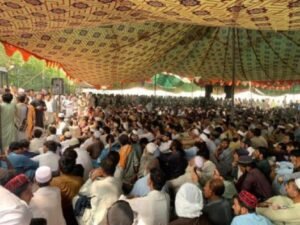Continuing Human Toll: Pakistan’s Controversial Drive to Evict Afghan Refugees

A family returns from Pakistan, crossing the Afghan side of the Durand Line. Photo by @Afghan for ADN
By Shinwari
Faced with rising terror attacks, Pakistan launched a drive in October 2023 to evict Afghan nationals residing as refugeesin the country over the last four decades. According to the data compiled by UNHCR and the International Organization for Migration (IOM), since October, 2023, more than half a million Afghans have been sent back by Pakistan to Afghanistan.
Pakistan’s shifting approach toward Afghan refugees delineates a path from an initial welcome to a stance marked by inhumane actions. Once viewed as a temporary haven for Afghans seeking refuge from war and poverty at home, Pakistan’s position has morphed into a firm determination to repatriate Afghans, leading to the expulsion of hundreds of thousands since 2023. The primary reason provided by Pakistan for these actions are said to be the purported involvement of Afghan refugees in terrorist incidents within Pakistan. However, substantiating evidence for these claims is lacking, suggesting they are primarily rhetorical tools employed by the Pakistani authorities to mask their shortcomings in counterterrorism efforts.
The consequences of Pakistan’s arbitrary measures have placed Afghanistan in a precarious position, forcing it to grapple with the strain of reintegrating returning refugees. The surge in returnees imposes unprecedented pressure on Afghanistan’s already fragile infrastructure and stretched resources, aggravating socio-economic challenges, and contributing to a humanitarian crisis of epic proportions.
According to the UNHCR, Pakistan is now home to around 3.1 million Afghans. Data shows 1.35 million are registered or Proof of Registration (POR) cardholders. More than 800,000 have Afghan Citizenship Cards (ACC) while the remaining are unregistered.
On coming back to power after a dubious election, the present Pakistani Government announced that they would be repatriating Afghan citizenship card (ACC) holders from April 15. This created a huge uproar from International organisations, forcing Pakistani Government to defer it to June, 2024. The Pakistani government has also stated that as per the ‘Illegal Foreigners’ Repatriation Plan’, they intend to repatriate even Afghans who have UNHCR-issued Proof of Registration (PoR) card holders.
The International Human Rights organization has categorically mentioned that Pakistan’s ‘Illegal Foreigners’ Repatriation Plan’ blatantly breaches refugee and international human rights statutes, particularly the principle of non-refoulement, putting the lives of all Afghan migrants at peril, especially women and children. The government’s decision lacks transparency and arbitrarily nullifies the legitimacy of ACC documentation issued by the Pakistani government itself.
Pakistan is not a party to the International Refugee Convention 1951 and the 1967 Protocol. It does not have any national legislation dealing with refugees. There is a complete lack of transparency, due process and accountability in the detentions and unlawful deportations of Afghan refugees in Pakistan, which was exacerbated by increased harassment and hostility towards them.
The geo-political scenarios also add an important dimension to this issue. Pakistan with its complete dependency on China has moved away from US and has increasingly act more as an extended arm of Chinese interests. With this, Pakistan has refused to exempt Afghans awaiting resettlement to the US from this repatriation to Afghanistan. Pakistan has mentioned that they would not honor the protection letters issued by the US Embassy in Pakistan to all Afghans registered with the United States Refugee Admission Program and awaiting resettlement back to the US.
Though Pakistan cites a lack of formal agreement with the US for dishonoring such requests, the real reason could be the increasingly fragile and difficult political relationship between the US and Pakistan, clouded by China.
Since 2023, Pakistan has expelled thousands of Afghan refugees. Those, who are still in Pakistan, are being subjected to harassment, intimidation, extortion, and arbitrary arrests. Civil society groups have been expressing concerns over the violation of refugee rights and have urged the Pakistani government to stop this ongoing forced expulsion. With the increasingly strained relationship with the Afghan Taliban, Pakistan might continue to treat Afghans, especially Pashtuns, as a national security threat.
Author chooses a single pseudonym. Shinwari is a freelance journalist based in Peshawar, Pakistan.
Note: The contents of the article are of sole responsibility of the author. Afghan Diaspora Network will not be responsible for any inaccurate or incorrect statement in the articles.





